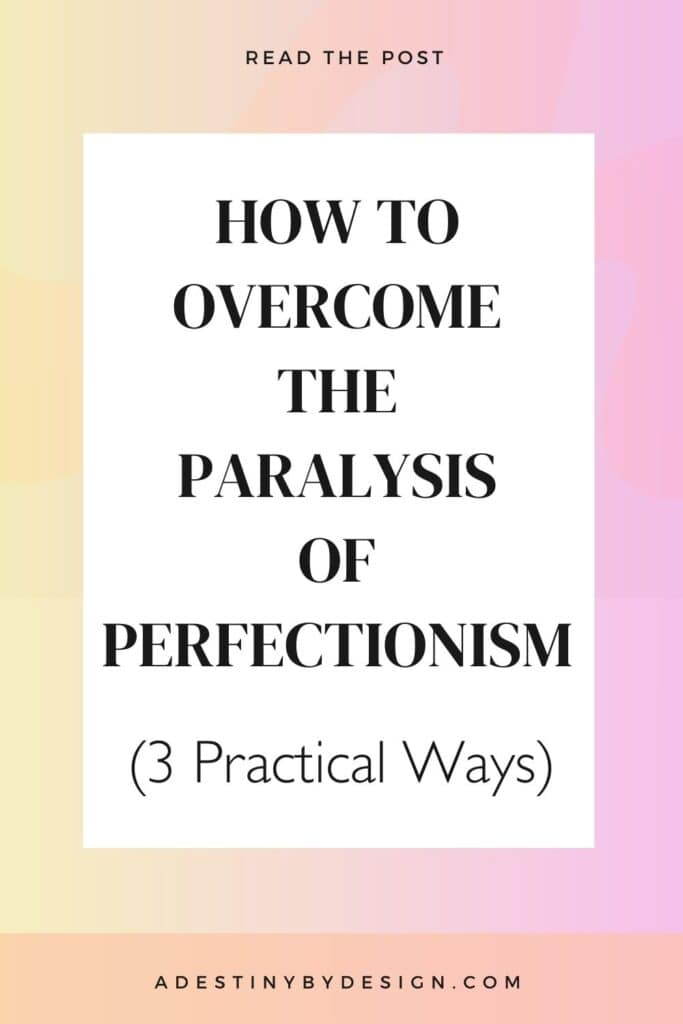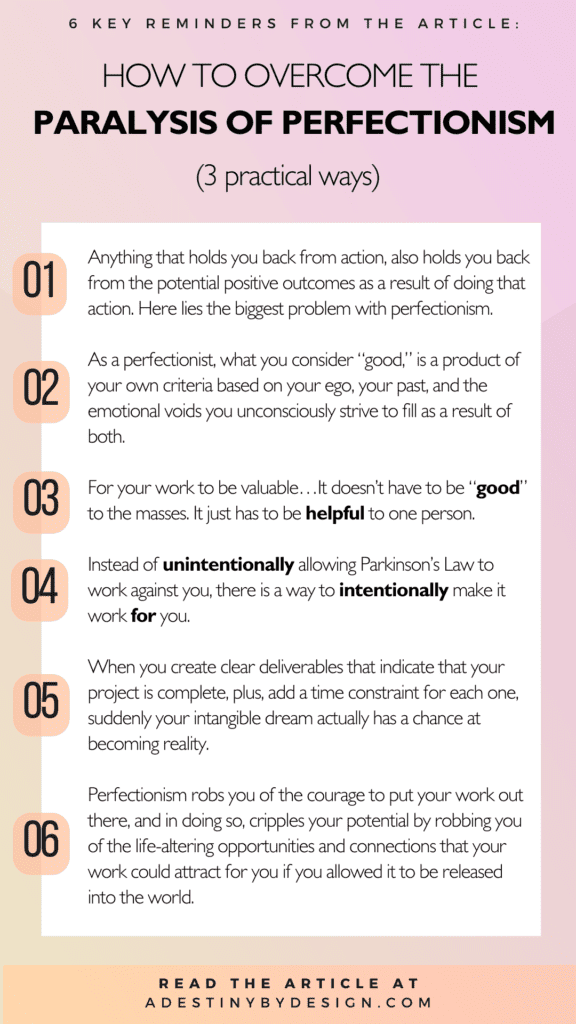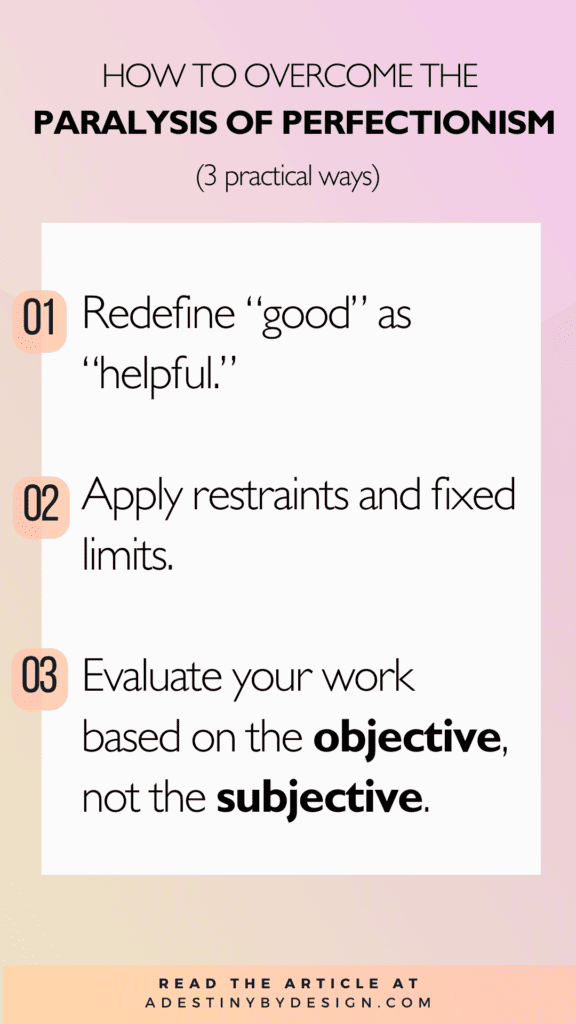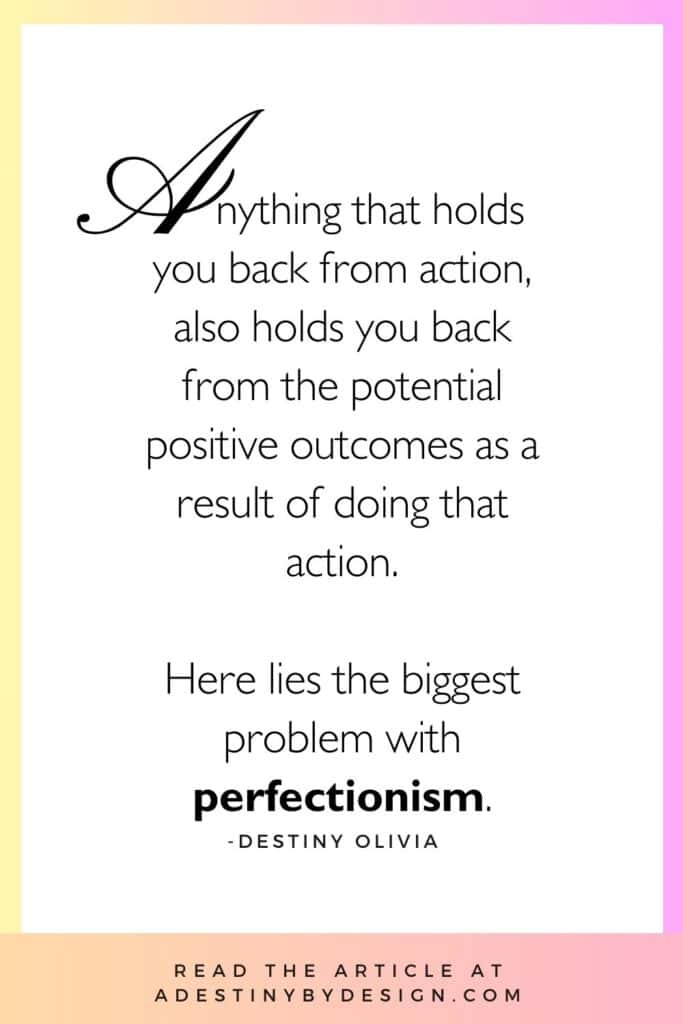How To Overcome The Paralysis Of Perfectionism (3 Practical Ways)

What’s your biggest weakness?
It’s the quintessential job interview question that we’re taught to (sneakily😏) answer with something that is really supposed to be perceived as a strength.
My go-to, ace-in-the-hole answer to this question (and I’m sure I’m not alone in this) used to be that “I am a perfectionist.”
There was a time where I did think that was a strength.
It indicated that I took pride in my work.
It was a signal that I hold myself to a higher standard.
It was a promise that I would go above and beyond what others would.
What could be so bad about that?
Well, I’m glad you asked…
Other than the self-inflicted psychological torture from incessantly beating yourself up over not being good enough, and thus eroding your self-esteem and depleting your motivation in the process, it holds you back from action.
Anything that holds you back from action, also holds you back from the potential positive outcomes as a result of doing that action. Here lies the biggest problem with perfectionism.
It is an obstacle to progress.
A threat to growth.
A hindrance to evolution.
This trait that took me so far in the corporate world (which is what made it so hard to shake) was holding me back when I left that corporate world.
The trait I once carried as a badge of honor very quickly became crippling in my entrepreneurial and creative endeavors.
Perfectionism turned to paralysis and I was gripped with the physically, mentally, and emotionally overwhelming fear that nothing I did was going to be good enough.
I was petrified to start this blog, petrified to start my email newsletter, petrified to publish a book. (I talk about all of that in the very first piece of writing I published, Scared 💩less).
No matter what I set out to do, I remained stuck in loops of editing, revising, re-strategizing, all to the detriment of the speed of my progression.
Over the years of immense struggle with crippling perfectionism, I’ve discovered several practices that have helped me get over the hurdle of perfectionism and actually get things done.
Here are three dead simple, practical ways to no longer be overcome by perfectionism, to the point where it keeps you stagnant.
With these three tips, you’ll be able to continue moving forward and making meaningful progress towards your goals, thus continually advancing towards creating the best version of your life (and your business).
BEFORE WE CONTINUE…
Speaking of overcoming perfectionism to no longer be held back from meaningul action that could potentially change your life for the better, and finally putting yourself and your work out there and getting things done…*inhales deeply*…
Check out my latest book, The Illusion Of Impossible, for timeless, univeral principles to help you overcome limiting beliefs–delivered with a small dose of humor. It’s available in all formats (pdf, epub, kindle, audio, paperback, hardback).

01 / Redefine “good” as helpful.
It took me yearsssssszzz (translation: a REALLY long time) to finally put my writing out there online.
The stakes felt so high when my name and face were attached to the writing, and it was something I had always wanted to do since I was a child.
Well, it was something I had always done since I was a child, just never publicly.
The interesting irony is that for about five years years before first putting my writing online, I had an online business publishing books on Amazon.
But with that business model, I hired ghostwriters to write books on various topics and I published them under pen names.
So my name was never on those books.
While I always published books that I carefully edited to ensure they were of high quality, without my name on the writing, ultimately, it didn’t matter to me what people thought of it.
I was publishing writing, but with a psychological safety net in place, a shield protecting my ego from any potential harm of judgment.
But with my blog and newsletter and social media accounts, all with my name on them, all of a sudden, the stakes are much higher.
Now, I want people to like it.
I need people to like it.
When the perfectionist wrestles with their work, it is because they are trying to make it “good.”
But (other than the fact that good is subjective) the problem that they do not realize is that as a (public) creator–one who puts their work out there-good is not the most important characteristic of their work.
When focusing on good, you’re focusing on the wrong thing: yourself, not the consumer of your creations.
As a perfectionist, what you consider good, is a product of your own criteria based on your ego, your past, and the emotional voids you unconsciously strive to fill as a result of both.
The “good” that you strive for demands that your work serve you more than it serves your audience.
You’re demanding that your work confirm your intelligence, creativity, wit, humor, etc.
It’s making it all about you.
But if you redefine good as helpful, and as a matter of fact, just replace the word good with helpful, it takes the pressure off of your work and drastically lowers the bar at which you feel comfortable sharing it.
So now, when I finish a piece of writing, instead of looking at it and first asking, “Is this good?” I ask “Is this helpful?”
Could this be helpful to someone else?
If the answer is yes, I have done my job and it’s good enough to publish.
Another very important thing to remember is that helpful is not synonymous with groundbreaking or original.
It could be those things, but it certainly doesn’t have to be in order to be helpful.
This gets a lot of people held up too.
They hold back on creating because they don’t think they can come up with something brand new.
First of all, anything expressed through you is new because it will have your spin on it, your voice, your personal touch that is unique to you and your personality, and colored with the twinge of the unique combination of your past experiences.
But more important to the point, helpful is just something that has some sort of positive effect in someone’s life.
And originality is not a requirement for that.
So no matter what you are creating, ask yourself:
Is this helpful?
In other words…
- Could this brighten someone’s day?
- Could this resurface an idea they may have heard before, but at just the right time?
- Could this be a perfectly timed reminder in someone’s life?
- Could this make someone want to share it with a friend who may need it even more than they do right now?
- Could this inspire someone to take a different action that could lead them down a different path?
If you want to get over the hurdle that’s keeping you from putting your ideas and your work out there, stop focusing on yourself, redefine “good,” and lower your bar.
For your work to be valuable… It doesn’t have to be good to the masses. It just has to be helpful to one person.
02 / Apply restraints and fixed limits.
The only way I get things done nowadays is by imposing fixed time limits for every task, and working on a clock.
Before I started doing this, working on tasks would go on forever.
According to Parkinson’s Law, tasks always expand or shrink to fill the container given to them.
If I give myself an open-ended amount of time to do something, well…it’ll never get done.
If I give myself eight hours to do something, it’ll take me eight hours.
If I give myself two hours to do something, it will take me two.
The more time I give myself for a task, the slower I work.
The less time I give myself for a task, the faster I work.
Ever experienced this phenomenon yourself?
This is Parkinson’s Law in action.
Instead of unintentionally allowing Parkinson’s Law to work against you, there is a way to intentionally make it work for you.
When I make my daily to-do list, instead of just listing each item, I put in brackets next to it how many minutes/hours I’m giving myself to do it.
On top of this, I use the pomodoro technique, and always work with a visible clock counting down.
With the pomodoro technique, you work on timed alternating intervals of work and rest.
Depending on the type of tasks I’m doing on any given day and how much continued concentration they need, I will vary my intervals according to what makes the most sense that day.
Common interval combinations I often resort to are:
- 30 minutes work / 5 minutes rest
- 50 minutes work / 10 minutes rest
- 90 minutes work / 15 minutes rest
After choosing the total number of hours I’m going to work for the day, I just let my pomodoro app run (I use Focus To Do), constantly alternating between work intervals and rest intervals, until my work day is up.
I can always see the clock counting down in the toolbar of my laptop screen.
This is the critical part.
Something about seeing a ticking clock makes me keep moving and stop pausing to ruminate, rethink, or overanalyze.
Plus, it helps give me something tangible to look forward to.
I know that each second that I see counting down is a second I am getting closer to being done.
Every step, every move, every action feels like progress when it is an increment of a fixed goal.
Imagine the difference between driving down a road endlessly and driving down a road towards a designated landmark that you can see getting closer and closer as you keep moving forward.
The perfectionist drives without a specific aim and is left feeling stressed, overwhelmed, and upset that nothing ever feels complete.
Impose time restraints on your projects, macro and micro, to revolutionize your efficiency and reduce your fixation on perfection.
03 / Evaluate your work based on the objective, not the subjective.
Instead of thinking of your project as this giant amorphous mass of work, break it down into objectively executable steps.
Instead of working with this question in the forefront of your mind…
What would it take to consider this perfect?
Ask…
What would it take to consider this done?
Perfect is subjective.
Done is objective.
Perfect can differ depending on who you ask.
But done is a universal state, that does not regard personal opinion nor taste.
Focus on scope of work instead of perceived quality of work.
Let’s say you want to write a book.
Most people would just leave it at “Oh, I want to write an amazing book some day.”
And most people never will.
As long as you’re thinking of it like that, it will never happen.
You’ve doomed yourself to fail from the start by creating your goal with subjective criteria.
So you want to write an amazing book?
Amazing to who?
An amazing book to one person is a terrible book to another.
As a writer, what you think is good, your reader may think is bad, and what you think is bad, your reader may think is good.
Even if you only considered your own opinion, what you think is good one day may not seem good to you another day.
So, “I want to write an amazing book” is an impossible goal that will keep you burdened with feelings of inadequacy and self doubt.
When you evaluate your work based on abstract criteria, perfectionism is left to run the show.
Perfectionism turns to paralysis, and nothing gets done.
You must bring specificity to your goal, and approach it in a manner that prioritizes completion over perfection, in order to make it happen.
Instead of saying “I want to write an amazing book some day”…
Write down what that actually looks like.
Turn your dream into a to-do list.
It may include things like:
- Make an outline
- Find a scientific study to corroborate the theme of each chapter
- Write one chapter of 5,000 words a week
- Break that down into writing 1,000 words a day, 5 days a week
- Find someone to edit my book on Upwork
- Brainstorm 20 titles, and choose one.
- Hire cover designer from 99 Designs
- Etc….
Create a clear list of deliverables for yourself.
When you create clear deliverables that indicate that your project is complete, plus, add a time constraint for each one, suddenly your intangible dream actually has a chance at becoming reality.
Final Thoughts
There is a myth that perfectionism is good.
But…I mean, look at the name…anything that ends in -ism already sounds like bad news to me.
It just sounds like a disorder, a disease.
And it is a disease–a disease to please the ego.
Perfectionism, at its extreme, is crippling.
And that’s what makes it so harmful.
Perfectionism robs you of the courage to put your work out there, and in doing so, cripples your potential by robbing you of the life-altering opportunities and connections that your work could attract for you if you allowed it to be released into the world.
So, stop striving for perfection.
And give yourself the gift of completion.
Your mental health and your future self will thank you.
If you enjoyed reading this article as much as I enjoyed writing it…
Every new subscriber gets a free habit tracker & you’ll never miss another mindset shift! It’ll be your favorite email you get every week 😊









